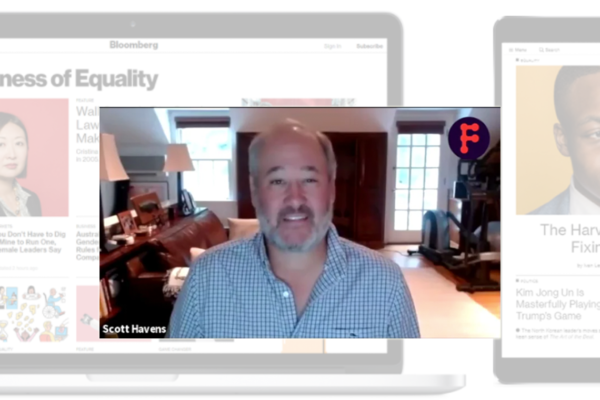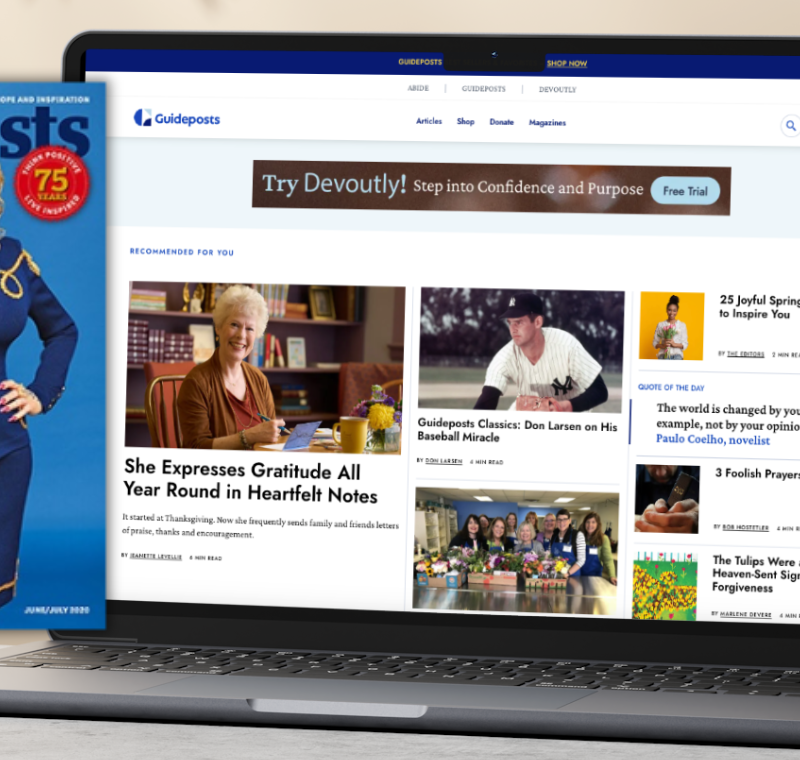The future of news – navigating out of a crisis
Few publishers have weathered the Covid storm better than Bloomberg Media – the group seeing a big bump in subscribers and online traffic during the height of the pandemic, while also successfully pivoting to virtual events and strengthening strategic partnerships. Much of their success has been down to being well prepared and flexible in the face of the crisis, explained Scott Havens – Chief Growth Officer and Global Head of Strategic Partnerships at Bloomberg Media US – while speaking at the 43rd FIPP World Media Congress.
“We were on this story very early in the year – our colleagues in Asia were being affected early, and our reporters were on top of the story – so we were thinking about this probably before anyone was calling it a global pandemic,” he said. “From a coverage, operational and strategic standpoint, before we left the office in March, we were planning for this because we had some insight into it.”
“While we’ve had similar challenges to other publishers like a contraction on the advertising side and a ceasing of all live events, it has actually been a pretty good year and, knock on wood, the projections we had in April were far worse than what actually is going to happen by the end of the year.
“There are a lot of bright spots. This is an unfortunate circumstance we find ourselves in but it does force companies to innovate and think differently. We have pivoted and innovated. We have looked introspectively at how we can be better strategically, even beyond Covid.”
The FIPP World Media Congress takes place through all September, with 80+ media leaders sharing insights and knowledge from around the world. Sign up to view sessions live or On-Demand. See the list of speakers here. Get access here.
A long reach
Working in Bloomberg’s favour has been the sheer breadth of the subjects the publisher covers.
“The type of journalism we do became incredibly valuable to folks working in the market, worrying about their investments and also worried about their health,” said Havens. “Both the traffic to our website and subscriber numbers were off the charts in March, April and May, doubling the size of our website to 120 million people.
“We are running elevated levels of traffic and subscribers from where we were in February so I hope that trend continues because there are plenty of people in the world who think of us as a B2B company and don’t think of us as a major player in business and general news. The dream has been for us to build up to a place where we have a balanced consumer revenue model and a balanced digital advertising model and we’re doing that.”
Hopefully this moment will be a breeding ground for new innovations to connect digital and live in a much more profound way than we do today.
The youth vote
An example of Bloomberg’s innovation was the way it reached out to students when they started to do distance learning in the spring, before extending a free offer for students to read Bloomberg.com in the summer.
“We thought it was a nice gesture and we wanted to introduce ourselves to a younger demographic. That was very successful with people converting to the student offer,” said Havens.
Bloomberg also realised early on that there was a public need for health content covering topics like vaccine development to be outside their paywall. Not only did it offer crucial content to those who could not afford it, but introduced more people to the company.
Virtually perfect
While not being able to stage live events has been a blow for Bloomberg, the group has used it as an opportunity to upskill at a rapid rate. A virtual version of Bloomberg Television’s popular show Peer-to-Peer (usually filmed in front of a live audience) drew tens of thousands of viewers, while they are taking their annual New Economy Forum online in November. According to Havens the planning of the events has been made easier by working from home.
“One of the interesting things about working from home was that we could dive in, get on a phone call very quickly and agree that we want to do this and we don’t have time to do a 100 meetings,” he said. “Those learnings are translating now that we are talking about other new things. Hopefully this moment will be a breeding ground for new innovations to connect digital and live in a much more profound way than we do today.”
This is such an amazing time of transition in the world and someone has to chronicle it in a way that the modern leader, who doesn’t have a cable satellite subscription and watches traditional media, will connect to it.
Partnering up
With Bloomberg’s 800 licensing, co-branding and other strategic partners facing tough challenges during Covid, the company has assisted in any way they can – being flexible with payment terms, helping partners to get up and running on virtual terminals and providing strategic and consultative support.
“For me and the team it was about how we can work more strategically,” said Havens. “Not just be at arm’s length and say ‘here’s some content’ but actually how do we build something together. And frankly, I am invested in their success.”
Going OTT
When looking at the future, Havens warned that if you are a news brand, it would be myopic to think about just one platform.
“You can’t just be a website, a social handle or a news network – you have to be everything because people have different habits, during different parts of the day to connect to the news,” he said. “We’ve got a 150 million views a month on QuickTake and are moving into OTT (over-the-top media service).
“It’s hard to launch an OTT streaming news network – it costs a lot of money – but if you have 2,700 journalists in studios around the world we are at an advantage here. This is a business network unlike anything I have seen where we go into long form documentaries and where every story is a business story. This is such an amazing time of transition in the world and someone has to chronicle it in a way that the modern leader, who doesn’t have a cable satellite subscription and watches traditional media, will connect to it.”
FIPP Insight Reports: Publishing During a Pandemic
Learn how the publishing industry is experiencing, responding to and planning to overcome the existential threat posed by the Covid-19 pandemic.
May 2020: Mapping a path through the Covid-19 crisis
June 2020: Emerging from the Covid-19 crisis
July/August 2020: Gearing up for a hybrid future









